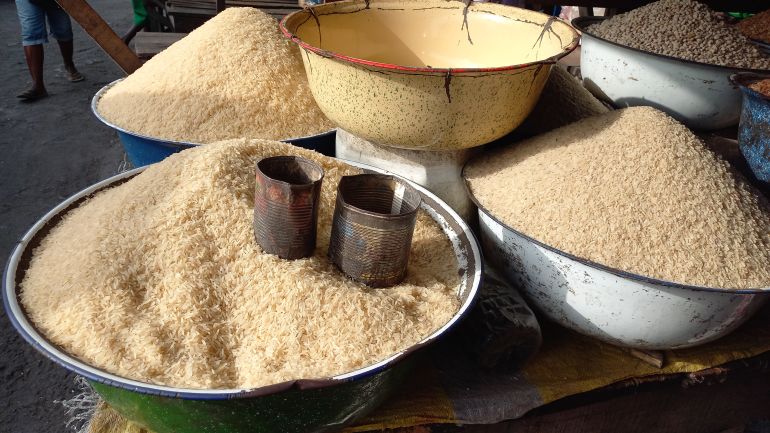[ad_1]
In a busy Lagos food market, a customer points at an enamel bowl filled with rice. “How much for a derica?” she asks.
Salesman Christopher Onyekwere scoops grains into a tin can and holds it up, listing the prices for local and imported rice.
Heavy use has worn the text off the tin can that once contained 400 grammes of tomato paste. The branding on most of the tin cans used to measure rice, melon seeds and black-eyed beans at Lagos’s Idi Alba market is equally illegible.
Derica is a unit of measurement found in markets all over Lagos, as well as in some cities in the south, like Port Harcourt, and the east, like Enugu. But where does the name come from? Twenty-one-year-old Onyekwere shrugs. “I have no idea.”
An older trader on the next street responds to the question with a smile.
“How old was the salesman you spoke to? You must have asked the wrong person. Too young to remember how popular De Rica tomato paste was,” says 49-year-old Henry Njoku.

Ubiquitous tin can
When Njoku moved west from Imo State to Lagos as a teenager in the 1980s to set up his food shop, vendors were already using derica as a measurement.
But the De Rica brand was once so widespread in southern Nigeria, he says, that it was used simply to mean tomato paste, whatever the brand.
Nigerian food writer Yemisi Aribisala remembers her grandparents using it when she was growing up in the 1970s and 80s. “De Rica was everywhere. At that time, everyone considered it the best tinned tomato,” she says.
As the tin cans were so ubiquitous, food vendors started to use the empty cans to measure food, each scoop being a “derica”. “We recycle so much, it makes sense those tins became a unit of measurement,” Aribisala adds.
There are also other units of measurement based on well-known products. Blue Band margarine tubs are used to measure a “butter”, while the smaller “cigarette cup” is measured by tins that once contained 50 cigarettes.
In Longthroat Memoirs, her 2017 collection of essays on Nigerian cuisine, Aribisala laments the challenges of trying to translate cigarette cups and dericas into the ounces and pounds of a cookbook. But she understands why the market vendors prefer to use them: “Good scales are expensive, and empty tins are free.”

Any can will do
Although the name “derica” is used, market vendors these days use cans with different brand names to measure this unit, says Njoku. At his Idi Araba stall, he points at the tins resting on the mounds of dry goods. “None of them are De Rica. We don’t find De Rica tins at this market any more.”
In 2017, the Nigerian federal government banned the import of tomato products to stimulate local tomato production. Because of the high cost of setting up a tin production line, which would raise consumer prices, locally produced paste, including De Rica, started mostly being sold in plastic packets, leading to the disappearance of the iconic cans.
“Goment don ban am [The government banned it],” explains Agatha Okonkwo in Pidgin.
De Rica was once the leading tomato paste brand, according to Okonkwo, the owner of AO Stores at the wholesale Mushin market, where all kinds of products, from Maggi cubes to dried crayfish, are sold.
“There was a time Nigerians said De Rica when they meant tomato paste,” she says. She’d rather not mention her age, but she remembers her mother cooking stew with De Rica in the 1960s. “Everybody used it. That time has passed.”
De Rica has its origins in a tomato processing factory that began operating in 1912 with 20 workers in the countryside of northern Italy’s Emilia-Romagna region. It is unclear when the brand first made its way to Nigeria, but Nigerian consumers, like Okonkwo, trace their first memories of it as far back as the 1960s.
The saleswoman shows row after row of cardboard boxes filled with 60gm sachets containing different brands of tomato paste. Only one carton holds De Rica. The others are mostly Sonia – “the cheapest” – and Gino – “the most popular” and similar in price to De Rica. Even before the government ban, De Rica was no longer the leading brand. “Competition is too much,” she explains.
“This is the only way you’ll find De Rica tomato paste today,” says Okonkwo, who has not seen the canned product for more than five years.

Brand loyalty
Today, some still swear by De Rica.
Victor Moses, a 31-year-old sous chef in Abuja’s upscale Wells Carlton Hotel, is famous for his smoky jollof rice. His secret for preparing the West African dish is letting the rice burn a bit before adding water. The other is using De Rica to bring out the smoky flavour of his dish, giving it “a rich taste like mustard gets”, he says. “And it also gives the rice a good red colour.”
Now the brand’s popularity has catapulted back to Europe, as Nigerians in the diaspora seek it out. “Nigerians are brand conscious,” explains Tim Szejnoga, an account manager for Dutch import company Unidex. “They will remain loyal to one brand their entire lives.”
The 400gm tin cans may no longer be available in Nigeria, but they live on in Lagos’s markets every time a seller measures out a derica.
This article is part of “Ordinary items, extraordinary stories”, a series about the surprising stories behind well-known items.
Read more from the series:
How the inventor of the bouncy castle saved lives
How a popular Peruvian soft drink went ‘toe-to-toe’ with Coca-Cola
[ad_2]
Prompt
Source link
#Nigerians #reinvented #Italian #tinned #tomato #brand #Features
